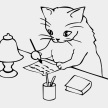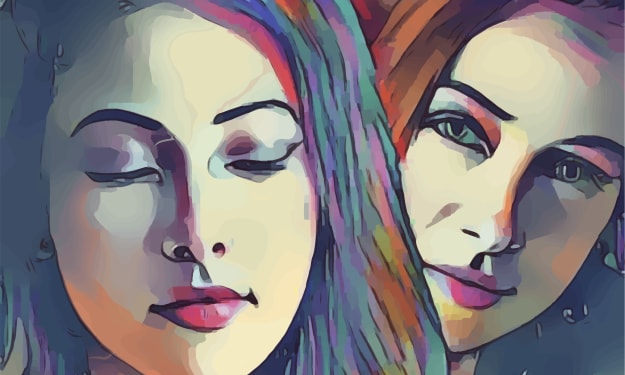When the Words Just Won't Come
Writer's Block in a Streamlined World

“Writing about writer’s block is better than not writing at all.” —Charles Bukowski
I have something to admit: I fall into writer's block far too often.
I know. So many writers say it doesn't exist. There are plenty of authors who say it's really just a writer's fear that is holding said writer back. Or maybe you just take a wrong turn in the writing and need to get back on the map's path.
But, no, seriously—writer's block exists for me. Sometimes it happens after I burn through a bunch of ideas for short stories and poems in a short period of time. Sometimes it's just depression rearing its dragon-like head up at me to blow smoke in my face. And sometimes I just look at a blank document and think, "Why am I subjecting myself to this again?"—before closing my laptop and shutting my eyelids as I try not to scream in frustration.
"But, Jillian," you say, "how can you have writer's block when you can burn through 33 poems in two weeks or over 20 sonnets in a week?" Well, my dear writer friend, those are what we call flukes. When I'm not working with a deadline, the words get murky and become phantom-like tendrils that I have trouble grasping. It can be quite like trying to catch a fish out of a river with your free hand. (And, if you're working on a novel draft, you're trying to catch the fish while you're riding a unicycle.)
But there is hope, my friend! I have some "hacks"—so to speak—that I utilize when I am deep in the mud of writer's block. Something here may help you too if you're just languishing with your own ideas and writing output.
The Freewriting Method
I forget where I picked up this idea—it might have been from an author while I was in my novel-writing phase—but it involves setting a timer for a specific amount of time, anywhere from 15 minutes to a half-hour, and you just write whatever comes to mind. It can be stream-of-consciousness blather, or you can try to construct a scene—but the stipulation is that you have to keep your pen moving or your fingers typing.
I tend to do freewriting exercises in a notebook. To make it easier, I often play a song on repeat to establish a kind of mood/theme for what I'm trying to write. And, when the timer goes off, I finish up the last sentence/thought and leave it.
Then I reread what I wrote and try to pick out some things that worked or things that may intrigue me for a longer piece. Sometimes I just come up with a list of things I'd like to write, and those things can help me have a jumping-off point to dive into the water.
While some writers may not feel this is a viable way to dig out of a writer's block period, I've found it helps me just to assure me this: it's always possible to have more ideas. Even when you think the well's dry, you can make a list of ideas to spur you onward. And they don't have to be good ideas. They just have to be enough to get you back in the motion of what it means to write—no matter what shape that process ends up taking for you.
Playlists
I've kept it no secret that songs are writing fuel to me, and some of you have picked up on the fact that I get a lot of inspiration from certain popular musicians (cough, Taylor Swift, cough). I collect songs the way some people gather stamps, coins, or other novelty items: I'm always looking for that next earworm to push me into a heady writing phase.
Recently, I've fallen in love with background music playlists that feature instrumental music that creates an ambiance. The beautiful thing is that you can search for a playlist fitting any kind of mood you're looking to achieve. There are epic fantasy playlists for those moments you're working on the fantasy novel you stash away during the bouts of your "more serious" work. You can get the whimsical feel of Studio Ghibli films from some playlists. Or, if you just want to pretend you're writing while sitting in a café, there are playlists for that too!
And, of course, there are playlists aplenty from providers like Spotify, Apple Music, and even Amazon Prime, especially if you prefer music with lyrics to latch onto. I'd recommend giving a few a try just to see if something brings you out of your comfort zone—something all of us need as writers who can get too deep in our own perceived niches.
Writing Prompts
I know the idea of writing prompts may seem like a no-brainer, but you'd be surprised how many writers rail against this tried-and-true option. Does the idea of using a prompt make it feel like the work is less "yours" somehow? I can understand that logic—to a point—but no two writers will tackle a prompt in exactly the same way.
Some of my favorite books that feature extensive writing prompts are Writing Magic: Creating Stories that Fly by Gail Carson Levine and The Writer's Idea Thesaurus: An Interactive Guide for Developing Ideas for Novels and Short Stories by Fred White—both of which can apply if you're tackling a short story, a novella, or even a novel. Sometimes when I'm being too hard on myself about all my lousy ideas, I'll flip through the books and search for something that just jumps out at me. Then I'll start to write from there.
Don't want to go to the library or spend money on a book you may not like or find useful? The good thing is that writing prompts abound on the internet. A quick no-frills Google search yielded me 106 million hits for writing prompts. One of my favorites is the defunct Sunday Scribblings, which featured a new writing prompt every Sunday, and I still look through the archives sometimes to see if there's a spark that reaches me. (I've also heard that Reedsy is quite popular for writing prompts.)
Want something more your own? Go to an online dictionary and look up weird/odd words that take your mind to different places. It's worked for me before when I felt like I was just drawing at straws. You just never know what will hit you to make you go, "I can get a story out of that."
(Also, a lot of Vocal members themselves say they treat the weekly and monthly challenges here as writing prompts of a kind.)
Music Videos
I love a good story in a music video. (I even went down that rabbit hole with a recent article.) Even without the song as the background track, you can still get a narrative out of a well-crafted music video.
Don't believe me? To go with my recent muse Miss Taylor Swift, let's look at the music video for her song "Cardigan". Now, I'm not saying to give a play-by-play of what's happening in the music video—that's too past the realm of "inspired by" boundaries—but just pick out a moment or a visual and ponder it for a bit.
What would I take away first? I like the idea of a girl who can access another world through the music she creates. Maybe my heroine would lose herself every time she plays the violin; every time she's on a stage, she feels transported to a different space. And, for those few spare moments, she is a queen leading a court of revelers, all who sustain themselves on the music she plays. But, as soon as the performance is over, she's back in the real world—and she hates it. She wants to find a way to be in that world forever. But how can she get there? And so the story starts to unfold with a main character, a want/desire, and a potential pathway for her to walk down in pursuit of her goal.
What I would recommend: pull up some of your favorite music videos of all time and jot down notes about them. What appeals to you? What makes you go, What if? What seed do you think can be plucked to sprout an entirely new story of your own?
The beautiful thing is that we artists—no matter the medium—tend to inspire each other organically in just this simple way. Don't believe me? Give it a try if you're struggling with a bout of writer's block. I don't think you'll be disappointed.
Journaling
You nonfiction writers have probably felt left out, haven't you? As someone who only dabbles in nonfiction—my life's not that interesting—I tend to shy away from "real-world" musings. Fiction is my blanket, and poetry is my comfort food, but nonfiction? It's that area of the house I go to least because it's just too cold for me.
Back when I had to write nonfiction pieces for a creative writing class, though, a lot of my ideas started out in the pages of the journal I kept at the time. I mused about memories and scenes long past, trying to frame them in just the right way for an audience. While my eventual pieces were not the sprawling rants/musings from my journal, I was able to take parts that resonated—or pieces I just wanted to explore more in depth.
If you're coming up dry for your latest nonfiction attempt, I highly recommend the journaling method. You're not trying to prove anything to anyone in the pages that only you are going to see. You can be yourself and spout what you need to say. And, afterward, you have threads of what can then be woven into tangible snapshots of your life and the world you experience firsthand.
Talking to Other Writers
As someone who was a lone wolf writing in closeted notebooks for a long time, this is the hardest one for me to do. Talking to other writers means reaching out—and, no lie, that puts you in a vulnerable position. It's not easy to confront a fellow creative person and ask, "Do you have any tips for getting over a bad patch with writing?"
But you have to learn early on that, if you have any sense of being a professional writer, you need a community to support you. Have you ever looked at an acknowledgements page in a novel before? Some authors go on for pages about the people who helped them weather the storm that was writing the books that came to be published. And a lot of those people are fellow writers.
I'm not saying you have to track down an in-person writers' group—I tried that myself once, to lukewarm results—but even a Facebook group or the writing tag on Twitter can work wonders for your steadiness as a writer. You may be afraid to ask for help, but these are your fellow creators. Surely they can offer some insight to a problem you may be facing in tackling your own work. We're not just competitors in a crowded field. We're artists trying to speak our truths in the surest ways we know how.
And if you have writer's block? There's probably at least one other writer out there who's willing to talk you through it, even if it's through just a casual exchange of messages. We've all been there. We know how it feels. And we can offer the same support we received back when we were struggling.
Don't know where to start?
That's okay! It can be overwhelming when you feel stuck in the swamp that is writer's block. You just need to find the process that works best for you.
And if none of what I outlined works for you? Keep trying to find something that will jolt that creative spark in you. It's out there. You won't wallow forever in the lows of your block.
There is light there beyond the fog. You just have to keep walking until you find it. Just keep walking the path before you.
You can do it. And so can I.
~~~
Did you find this article helpful? If so, please kindly leave a heart before you go! You can also check out my profile page for more musings. If I get out of my recent writer's block phase, you can expect even more to come down the pipeline. Thanks for reading!
About the Creator
Jillian Spiridon
just another writer with too many cats
twitter: @jillianspiridon






Comments
There are no comments for this story
Be the first to respond and start the conversation.